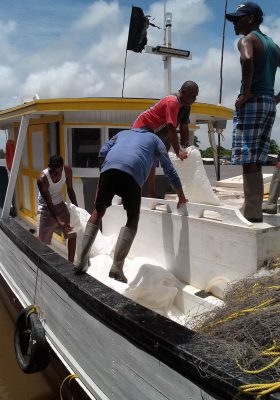When Stabroek Business met with Sarran Lallbachan at his Charity office on Saturday he was ‘sitting in’ for his father, Kumar who he told us is currently out of Guyana. That leaves the younger Lallbachan as the man at the helm of a significantly diversified business enterprise that includes a gasoline station, a creole restaurant, a hardware store, an ice factory, a Western Union franchise and most prominently, a thriving Fish Port at Charity. Last December, a Meat Centre was added. Taken together, the business complex is named Big Bird and Sons.
It had begun with the Fish Port in 1997 and we had engaged Mr. Lallbachan over the weekend primarily to learn more about how the fish business was faring.
Our earlier conversations with businesses owners on the Essequibo Coast had begun with Essequibo’s Second Agriculture and Trade Fair staged by the local Chamber of Commerce and after that the state of the Essequibo economy as a whole. With regard to the Trade Fair the businessmen with whom we spoke proffered a sort of we-believe-it-could-have-been-better-supported kind of answer though they were mindful for the patronage of those who came to parade and hopefully market their goods and services and for the presence of a ministerial representative (Business Minister Dominic Gaskin) from Georgetown.

With regard to assessments of the state of the Essequibo economy the answers really depended on who you spoke to though the compelling partisan political overtones in some of these could hardly be overlooked.
On the Essequibo Coast, however, you get the impression that the focus of the business community is simply on businesses owners putting down their heads and working, mindful, it seems, of not being caught in the trap of becoming preoccupied with the challenges they face getting left behind in the process.
Sarran Lallbachan, it seemed, is one of those young Essequibo businessmen who is preoccupied with ‘delivering’ for the business that his father built rather than becoming overly preoccupied with the challenges.
Business, for him, revolves heavily around the Fish Port at Charity. It is here that the company buys fish from the boats that come and go.
The sale of fish on the wharf at Charity is an event in itself. The fishermen would call in advance to say when their boats would arrive at Charity laden with Gilbaka, Trout, Snook, Cuirass and Grey Snapper. Big Bird had begun by selling fish to Venezuela. It seems that while it had been, for a time, lucrative, amassing the volumes necessary to be competitive on the Venezuelan market became a formidable challenge. Over time, problems arose in collecting monies from Venezuelan clients. Eventually Big Bird stopped doing business with Venezuelan buyers and began to target the export buyers in Georgetown.
The arrival of the fishing vessels at ‘port’ Charity is staggered. The vessels spend approximately eighteen days out at sea, fishing, so that they arrive at Charity at different times, laden. The fish is offloaded and frozen, Big Bird’s Ice factory a manifestation of the manner in which the enterprise is integrated. The Factory provides for the company’s own needs as well as those of the other fishing boats and the fish vendors.
Once the cumulative purchases from the fishermen at Charity reach between 30,000 and 35,000 pounds the fish is then moved to Georgetown, overland and across the Essequibo River in refrigerated trucks. The fact that river transport has improved and now has the capacity to carry larger numbers of vehicles has improved the efficiency of the operation. Time was when boat schedules were unreliable and there was the requirement that trucks arrive at the stelling several hours prior to the departure of the vessel. That too is no longer the case.
If there may be ‘seasons’ when supply limitations result in energetic haggling over prices, the business is sustained by a continually high demand for fish for both the local and export markets. In Georgetown, Big Bird has regular markets that include Pritipaul Singh and Suresh Singh Enterprises, which companies are active in the fish export market and the younger Lallbachan seems set to have the company soldier on in a market whose competitiveness still allows for those in the fishing business to do more than just hold their heads above water.









